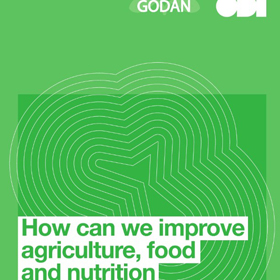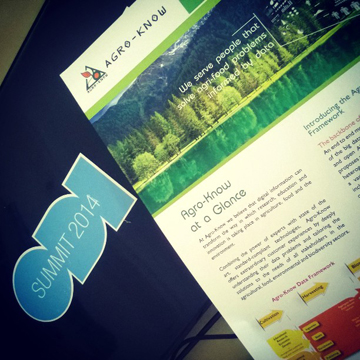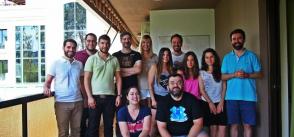
Open data and agriculture | Interview with Vassilis Protonotarios
The Agro-Know blog is an interesting window on the field of agrifood and its innovation as well as an important point of reference for knowledge dissemination. it offers a timely and curious selection of news, projects, and interviews on scientific research and agriculture with a focus on the role of open and big data and Open Access.
Thanks to the engaging role on social media, we discovered Agro-Know and one of its founder, Vassilis Protonotarios, to which we asked some questions.
1) Agro-Know is one of the active partners of the Global Data for agriculture and Nutrition GODAN. Recently, a new paper came out from this project titled: How can we improve agriculture, food and nutrition with open data? It is precisely from this question that we would like to start this interview. What can you tell us about the role of open data in improving agriculture, food and nutrition? What do you think the scenario of open data in agriculture will be like in the next 10 years?
 GODAN has been doing a great work over the last years in engaging governmental agencies and organizations, private companies, and other major actors in the field of agrifood data, in activities aiming to facilitate opening up access to their data. Agro-Know was one of the first companies to join GODAN, as it actively supports open access and open data initiatives and activities in the agrifood sector; after all, Agro-Know provides added-value, data-powered services on top of open access & data sources. The specific GODAN Discussion Paper was prepared over the previous months and presented during the 3rd International Open Data Conference 2015 last May and I was honored to be personally involved as one the authors of the Paper through a collaboration with the Open Data Institute (ODI). The Paper provides a wealth of information on open data in agriculture and nutrition, including a number of selected use cases that highlight the importance of various types of open data in agriculture and nutrition.
GODAN has been doing a great work over the last years in engaging governmental agencies and organizations, private companies, and other major actors in the field of agrifood data, in activities aiming to facilitate opening up access to their data. Agro-Know was one of the first companies to join GODAN, as it actively supports open access and open data initiatives and activities in the agrifood sector; after all, Agro-Know provides added-value, data-powered services on top of open access & data sources. The specific GODAN Discussion Paper was prepared over the previous months and presented during the 3rd International Open Data Conference 2015 last May and I was honored to be personally involved as one the authors of the Paper through a collaboration with the Open Data Institute (ODI). The Paper provides a wealth of information on open data in agriculture and nutrition, including a number of selected use cases that highlight the importance of various types of open data in agriculture and nutrition.
These use cases show how open data are used in practice to help farmers in diverse cases such as the management of their farms and crops through weather forecasting, the reduction of harmful inputs like fertilizers and pesticides through the exploitation of existing inputs, the selection of the most appropriate crop variety for a specific field through the use of open data models, the fair distribution of farm subsidies through the opening of financial and land use data etc. Working on this paper helped me realize the amount of agrifood data that are openly available out there.
At the same time we identified issues related to the licensing of data, the education of data producers on the advantages of opening up their data and the rights that they still reserve and the lack of interoperability between open data sources and systems, to name a few. These are challenges that need to be addressed within the next years so that food production systems will be optimized and ready to support a world population of more than 9 billion by 2050, taking into consideration existing limitations (e.g. in arable land available) but without the need of increased inputs.
My vision for the next 10 years regarding open data in agriculture is to have not only a lot more open data sources available but more usable at the same time.
We need to ensure that open data uses a standard format (or set of formats) that will facilitate the interoperability between different systems, platforms and tools - if this is not possible, we need to ensure that related data can be linked somehow (e.g. through the use of common vocabularies to be used for its description). In the future we will need well-formed and well-described open data in agriculture so that they can be easily accessible and readable by both machines and humans, easily processed and available for different uses. We will need to engage developers in working with open data, ensuring seamless data flow through open APIs that may be reused for diverse applications. We will need data producers, from individual farmers to large corporations to be well-educated about open data and share openly the data they produce or manage through transparent processes and companies to make use of these data by providing useful services to a wide variety of end users. It is obvious that all these activities need to be coordinated at a high level and this is where a global network like GODAN can provide the means to achieve this - at the same time, this is where companies like Agro-Know can share their expertise and provide added value services on open data, serving various types of stakeholders and applications with their data-powered solutions.
In the future we will need well-formed and well-described open data in agriculture so that they can be easily accessible and readable by both machines and humans, easily processed and available for different uses. We will need to engage developers in working with open data, ensuring seamless data flow through open APIs that may be reused for diverse applications. We will need data producers, from individual farmers to large corporations to be well-educated about open data and share openly the data they produce or manage through transparent processes and companies to make use of these data by providing useful services to a wide variety of end users. It is obvious that all these activities need to be coordinated at a high level and this is where a global network like GODAN can provide the means to achieve this - at the same time, this is where companies like Agro-Know can share their expertise and provide added value services on open data, serving various types of stakeholders and applications with their data-powered solutions.
This will allow farmers to make better-informed decisions related to their crop production leading to increased yields, governments to ensure a better allocation of farm subsidies and policy makers to decide with more confidence on topics related to agriculture.
2) Agro-Know is part of the consortium of agINFRA - A research data hub for agriculture, food and the environment, in which we found many interesting initiatives. The Research Projects and Institutions attracted our attention. Could you tell us something about the role of the recently released European research map of the Big Data?What are the potentials of similar initiatives?
agINFRA was one successful FP7 project that Agro-Know was a consortium partner of. agINFRA is currently being transformed into a European domain-specific hub of agrifood research data, aiming to engage researchers in the agri-food sector to publish and share their data openly, using a set of recommendations referring to standards used in the specific domain. agINFRA is also one of the initiatives behind the European map of research projects, initiatives and institutions working with big data in the agri-food sector, along with UN FAO, GODAN, Agro-Know, the Alterra Research Institute, the Big Data Europe Horizon 2020 project and BIG T&U Horticube.
The potential of this activity is huge, as it will allow the identification of organizations and projects working with big data in the same domain, the recording of the big data sources and the engagement of stakeholders from these organizations and projects in discussions and future developments that will boost the usage and exploitation of big data in agriculture. The involvement of global organizations & initiatives, such as UN FAO and GODAN, provides a mean for spreading the word as much as possible, while the involvement of Agro-Know and Alterra allows a higher level of flexibility and engagement of various types of stakeholders.
At the same time, Agro-Know is currently planning a similar activity for the Wheat Data Interoperability Working Group of RDA that Agro-Know is an active contributor of, aiming to identify people, organizations and projects (among others) that are working with wheat research data so that an interoperable and dynamic database of related information can be developed as a next step.
3) You are very active on social media, a channel which is, in our view, fundamental for favouring the meeting and exchange among different communities: from the research community, to civil society, and policy-makers. What is your experience with social media and how did they change the way in which you work?
Agro-Know has invested on the use of social media for the dissemination of information related to its activities and field of expertise, moving from investment in typical printed material (such as flyers and brochures) to the more dynamic and diverse online presence through various social media and a blog. A large part of our work is closely related to agri-food information and knowledge management, as well as open access to research publications and data. In this context, social media help us promote not only the work that we are doing but also keep our friends, colleagues and collaborators informed on the topics that are of interest to us (and them).
It is true that a vast amount of research that is conducted in our field is not sufficiently nor properly disseminated so what we are trying to do is to contribute to the promotion of this knowledge to various types of stakeholders, including (but not limited to) researchers, practitioners, data & metadata managers, policy makers, project managers as well as general audience.
We believe in openly sharing information and knowledge and social media provide us with the mean to do so!
The main tool of our social media arsenal is our blog, which is open to everyone and allows each one of us to share his/her opinion on topics of interest. At the same time, it is used for reporting from events that we participate in, present our current (and past!) work and for sharing formal and informal information about Agro-Know. All blog posts are further promoted through our Twitter account, our Facebook page and LinkedIn page. We are also maintaining a Google+ page, mostly for those not using Facebook. You can also find Agro-Know on Flickr, Slideshare and YouTube. These channels are not as frequently updated as the former but they are used for showcasing our work in the form of multimedia files (images, presentations and videos respectively).
 Our experience so far from social media is positive; people express interest and this is confirmed by their contributions (e.g. likes & sharing of content); however, it is obvious that this content is mostly used for "consumption" and not as a basis for discussion - this is highlighted by the lack of comments in our blog posts and posts in Facebook for example.
Our experience so far from social media is positive; people express interest and this is confirmed by their contributions (e.g. likes & sharing of content); however, it is obvious that this content is mostly used for "consumption" and not as a basis for discussion - this is highlighted by the lack of comments in our blog posts and posts in Facebook for example.
We believe that this is due to two major factors:
1) the abundance of information that everyone receives on a daily basis combined with lack of sufficient time for actually commenting on anything. It is much easier to see something of interest, press a "Like" button and share, in the best case scenario, than to take a couple of minutes to think and share your own opinion, agreeing or disagreeing on what is shared.
2) The chasm between people managing social media for organizations and those actually interested in the news shared through them. For example, there may be the possibility that an international agricultural research center has outsourced its social media management to an agency or individual with no background in agriculture. As a result, the specific person might be ideal for copywriting, sharing and spreading the news of the research center, reporting from events related to the center etc. but at the same time this person might not the right person to identify news of interest to the organization that he/she is working for, shared by similar organizations, and comment on them. So, if a researcher does not come across the news himself, he will not be able to get this information.
This highlights the need for people with expertise in the agrifood domain to be involved in the dissemination of information, knowledge and research outcomes, in order to maximize the efficiency and outreach of such activities. We are glad to collaborate with other initiatives that are actively involved in the sharing of information and knowledge in the agrifood sector, such as FAO AIMS and CIARD.
4) Lastly, a curiosity. You are among the few that use Instagram in an original way, also by sharing personal moments and daily events. Which message do you want to transfer to your followers?
Instagram was the last social network that we decided to use; it started as an informal, personal mini-project, aiming to showcase some highlights of the work that we are doing in Agro-Know, including events that we organize or just participate in, proposals that we are working on and any other kind of development - including the promotion of our blog posts. People really liked it so we put more effort and thought on the specific channel. As you have already noticed, we recently decided to use Instagram for providing insights on the working environment of Agro-Know, focusing on the people and informal activities of Agro-Know. Despite the fact that we are really hard workers, at the same time we have a great working environment and we usually have fun at the office so we would like people to know that! In this context, Instagram looks like the most appropriate tool to allow us present both a different aspect of our work and at the same time the casual, human part of our lives in the office.
The feedback that we have received is mostly positive; there are people who enjoy looking behind the scenes and getting a taste of how we operate and behave in our working environment. At the same time, this looks strange to other people who have a stereotype of a more formal company; however, Agro-Know is an extraordinary company in various aspects so we feel great with what we are doing with Instagram!
We were surprised to see that there are already several friends and collaborators on Instagram (including UN FAO, Bioversity International, CABI and NCSR Demokritos) as well as many individuals who use it for reporting back from events of interest to us (see for example the latest Open Data Conference 2015 and the #IODC15 hashtag on Instagram). We connect, share and comment, trying to encourage this currently small community grow - because we believe in Instagram :-)
Thank you very much for your collaboration!
[All photos via Agro-Know | Instagram channel]







